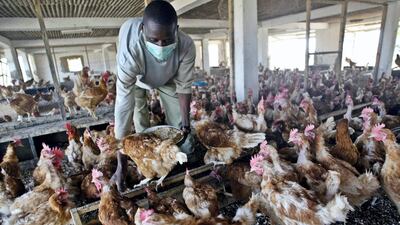Live birds from Hungary and Slovakia have been banned from import into the UAE following an outbreak of highly contagious bird flu.
Health officials at the Ministry of Climate Change and Environment were handed the directive from the World Organisation for Animal Health which comes into force with immediate effect.
Only heat-treated meat and eggs will be allowed into the country to guard against spreading the strain of H5N2 virus.
“These measures will enhance bio-security levels and eliminate pathogens before they enter the country,” said Kaltham Kayaf, acting director of the ministry’s animal development and health department.
“In doing so, the ministry prevents the bird flu virus and related risks and impacts on the country’s poultry health and safety, in addition to protecting public health and well-being.”
Measures taken to prevent the spread of infection include an import ban of all species of domestic and wild live birds, ornamental birds, chicks, hatching eggs, meats and meat products and non-heat-treated wastes from Hungary and Slovakia.
Other steps are regulation of the import of poultry meat and non-heat-treated products.
Exported meat and eggs from Hungary and Slovakia must be accompanied by a health certificate before consignments are released into the country.
Documents accompanying imported produce must include certificates to prove its origin and if it is halal.
Health officials are also conducting tests on samples taken from imported goods to prove they are safe for consumption.
The H5N2 avian virus is a subtype of influenza, and typically infects a wide variety of birds such as chickens, ducks, turkeys, ostriches and falcons.
The virus is easily spread among birds, but rarely between humans.
Symptoms can include a cough or respiratory problems, a fever, headache, runny nose, muscle ache and general weakness.
These generally appear up to 10 days after exposure.
People in prolonged contact with infected birds are most at risk, or those working in farms or live bird markets where contact with faeces and respiratory secretions are more likely.
An outbreak of bird flu was recorded in 2013 in China, mainly infecting people working in live bird markets.


